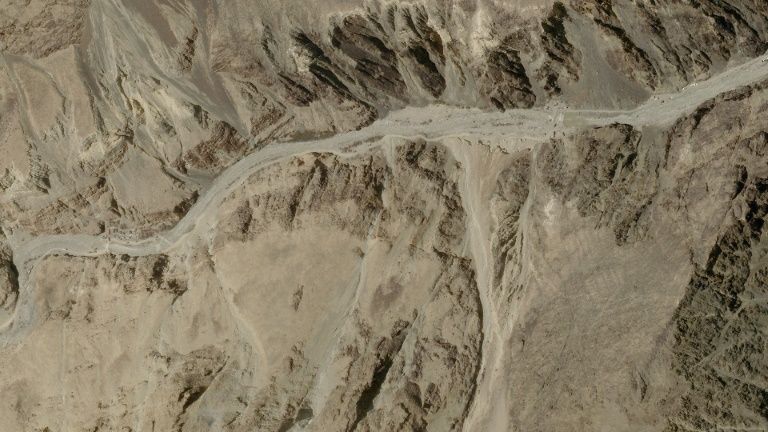India, China agree to ‘complete disengagement’ from deadly border flashpoint
Indian army sources said Chinese soldiers were seen dismantling tents and other structures in the contested Galwan Valley in Ladakh, the scene of deadly hand-to-hand fighting last month. ©2020 PLANET LABS, INC./AFP
New Delhi (AFP) – Chinese troops were seen removing structures from a Himalayan valley where they fought a deadly battle with Indian soldiers last month, Indian army sources said Monday, after high-level talks between the nuclear-armed neighbours.
Brutal hand-to-hand fighting in the Galwan Valley in Ladakh on June 15 left twenty Indian soldiers dead and sent tensions between the countries soaring. China has acknowledged it suffered casualties but has not given figures.
The two sides agreed on Sunday to “completely disengage” from the border flashpoint and ensure “a phased and stepwise de-escalation in the India-China border areas,” India’s foreign ministry said Monday.
In a CCTV readout of the meeting, China’s representative Foreign Minister Wang Yi said Beijing would “effectively defend its territorial sovereignty, while maintaining peace in the border areas”.
Earlier, an Indian army source told AFP that China’s People’s Liberation Army soldiers were seen removing tents and structures in the Galwan Valley, and military vehicles were being moved back.
“Disengagement with the PLA has started as per agreed terms in the Corps Commanders’ meeting,” the source said, adding the Indian army was verifying how far back Chinese forces had withdrawn.
There was no comment on whether there was a similar withdrawal by Indian troops.
The Galwan Valley incident was the first time in 45 years that soldiers had died in combat on the Asian giants’ long-disputed border.
Chinese foreign ministry spokesman Zhao Lijian told reporters in Beijing on Monday that both sides had made “positive progress… to disengage frontline troops and ease the border situation”.
“We hope that the Indian side will go with the Chinese side to implement the consensus reached by both sides with practical actions,” Zhao added.
India and China fought a war over the frontier in 1962.
Anti-China sentiment has been growing in India since the high-altitude clash, with the government banning Chinese mobile apps including the wildly popular TikTok.
Disclaimer: Validity of the above story is for 7 Days from original date of publishing. Source: AFP.


